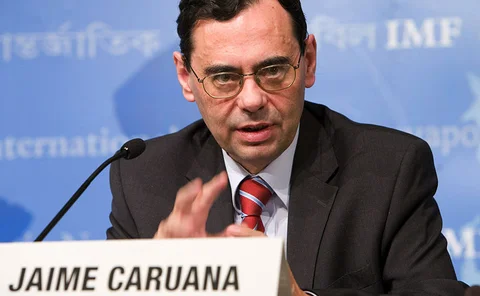Central Banking Newsdesk
Follow Central Banking
Articles by Central Banking Newsdesk
BIS’s Caruana: central banks up to stability task
Bank for International Settlements’ Jaime Caruana says crisis highlighted the prominent role central banks should have in financial stability policy
Watch money growth like ECB does: Trichet
ECB president Jean-Claude Trichet says the central bank has always considered monetary aggregates in its policy decisions, and urges the rest of the world to do so
Some microfinance rules to mirror banks’: Basel
Basel Committee on Banking Supervision says some of its original principals on effective banking supervision will broadly apply to microfinance with a little tweaking
Inflation targeting the best available option: RBNZ’s Bollard
Reserve Bank of New Zealand governor Alan Bollard says although the method has not always ensured stability, it is better than the alternatives
Bundesbank – Monthly Report (January)
German central bank’s monthly report shows that although the recovery lost momentum at the end of the last year, the process was still carrying on
Fed’s Kohn: don’t underestimate interest-rate risk
Federal Reserve’s Don Kohn says it is crucial interest-rate risk does not undermine the safety and soundness of the most important lenders
Middle East and North Africa’s trade below potential
International Monetary Fund looks at trade constraints in the region
Bank of Japan – Public Opinion Survey
Japanese central bank’s survey on public views and expectations shows more expect further economic woe
Hungary to buy forint mortgage bonds to spur lending
Move by the National Bank of Hungary highlights concern over return to euro financing, seen as key cause of crisis
Towards a euro monetary fund
Daniel Gros and Thomas Meyer team up on fix aimed at stopping another Greece
Barbados’ Worrell: supervisors of the region unite
Central Bank of Barbados’ governor urges Caribbean supervisors to ramp up cooperation
Chile on the pros and cons of connectivity
Central Bank of Chile looks at how shocks are transmitted across markets and banking systems
Greece should go to IMF, not EU for aid: Issing
Former ECB chief economist advocates tough love from Washington, rejects Brussels bailout; position conflicts with senior EU bureaucrat
Ex-NY Fed chief opposes Volcker rule
Former New York Fed head Jerry Corrigan, now at Goldman Sachs, plays down impact of banks’ activities; warns against regulatory arbitrage
Drop the math, Finland’s Liikanen tells economists
Bank of Finland’s Erkki Liikanen says profession will have to be more humble post
Ex-IMF chief economist wants Fed’s Hoenig for Treasury
Simon Johnson says lone FOMC dissenter “entirely plausible” successor to Tim Geithner
Rate round-up: bulk of central banks hold
Rate decisions this week see a slew of institutions maintain policy stance
Modeling the demand for reserves
A new working paper from the Swiss National Bank estimates a demand curve for central bank reserves
Real-time macroeconomic monitoring
A new paper from the Philadelphia Fed sketches a framework for monitoring the
Fed’s independence in public’s interest: Bernanke
Ben Bernake says the Federal Reserve will work with Congress to ensure maximum transparency
SWFs innocent of political bias
OECD looks at whether sovereign-wealth funds’ investments are politically motivated
US debt ratio drives international exchange rates: Bank of Canada
A Bank of Canada paper posits that the debt to GDP ratio in the US and commodity prices have great impact on bilateral exchange rates
ECB – Economic and Financial Developments in 3Q 2009
European Central Bank release shows the euro-area economy climbing tentatively out of recession, but non-financial corporations suffer





















